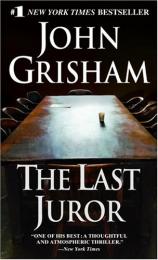The Last Juror
Review
The Last Juror
Each February, a Grisham novel hits the stores and immediately
scores a place at the top of the bestseller list. What ensures this
success? Some of it has to do with predictability; some with
unpredictability. Cracking the spine of a Grisham thriller, readers
know they find themselves submerged in a legal battle. The
characters that will be encountered and the social issues that
might be addressed are unpredictable. This combined with the
effects of law and the legal system on everyman --- and just plain
good storytelling --- makes Grisham's books intriguing adventures.
THE LAST JUROR does not disappoint at any of these levels.
Many readers think Grisham's first book was THE FIRM, but that book
was not Grisham's first publication. A TIME TO KILL was his first
shot at courtroom fiction. Fifteen years ago, with a press run of
5,000, a small Southern publisher published A TIME TO KILL in
Grisham's home state. The book received little notoriety until the
popularity of THE FIRM and Grisham's second blockbuster, THE
PELICAN BRIEF. After its re-release, A TIME TO KILL reached not
only the bestseller list but was also a popular movie
THE LAST JUROR is set in the fictitious town of Clanton,
Mississippi, in Ford County, which readers may recall was the
setting for A TIME TO KILL, Grisham's first book. The events that
are the narrative of THE LAST JUROR are recounted through the eyes
of Willie Traynor, a Memphis-born and eastern-educated journalist.
He comes to Clanton because one of his fellow journalism students
advised him that a small local newspaper was in fact a gold mine;
in addition to printing newspapers, his presses would make him fast
money. After a short-term internship for the Ford County
Times, the paper is forced into bankruptcy. Fortunately, Willie
has what every young entrepreneur needs to start a business: a
wealthy relative. With $50,000 borrowed from his grandmother,
Willie rescues the paper from bankruptcy and begins his career as
editor, publisher and reporter for the Ford County
Times.
Potential readers need not fear that Grisham has written a tale of
journalists and the woes of publishing a weekly tabloid. Be assured
that the Grisham formula of crime, courtrooms and attorneys is
still a cornerstone of this novel. In fact, savvy Grisham readers
will note that several of the attorneys who they previously met in
A TIME TO KILL also are characters in this novel.
The crime that forms the foundation of THE LAST JUROR is a brutal
rape and murder committed by Danny Padgitt, scion of a powerful
outlaw Ford County family. Residents fear Padgitt will use his
power and influence to escape punishment for his crime. The trial
occupies a substantial portion of the book and reaches an ugly
climax when the defendant, upon completing his testimony and
leaving the witness stand, turns to the jury and announces, "You
convict me and I'll get every damned one of you."
One of the jurors threatened is Miss Callie Ruffin. Willie meets
Miss Callie as he is writing a local interest article about her
unique family. All of Callie's children, save one, have overcome
the segregated life of Mississippi in the 1960s to become college
professors. Like many blacks in that era, they left the South to
accomplish their goals. Traynor goes to Miss Callie's house in
order to write about this remarkable woman and the rest, as they
say, is fate. Miss Callie is selected to be the first African
American to serve on a jury in Ford County. She is the last juror
selected in the trial of Danny Padgitt.
There is something loving and stirring when John Grisham writes
about his native Mississippi. His affection for his home state
shows, as he describes not only the people of the South but the
lifestyle they have cultivated. As Grisham describes the region
during the tumultuous time frame of the Civil Rights era and the
Vietnam War, he is honest enough to acknowledge both the good and
bad of the region. Reading Grisham, the reader is struck by the
fact that the South is not as evil as most Northerners often
portray, but also not as noble as most Southerners would like to
believe.
In addition to the historical ruminations about his beloved South,
Grisham delivers the twisting and turning conclusion that his
readers have grown to expect. THE LAST JUROR may be the best of his
recent novels. Just like Miss Callie's comforting home cooking, it
is pleasant to have another John Grisham novel on the reading table
--- and it's as satisfying to complete this as it is to finish a
fine meal of Southern cuisine.
Reviewed by Stuart Shiffman on January 22, 2011





